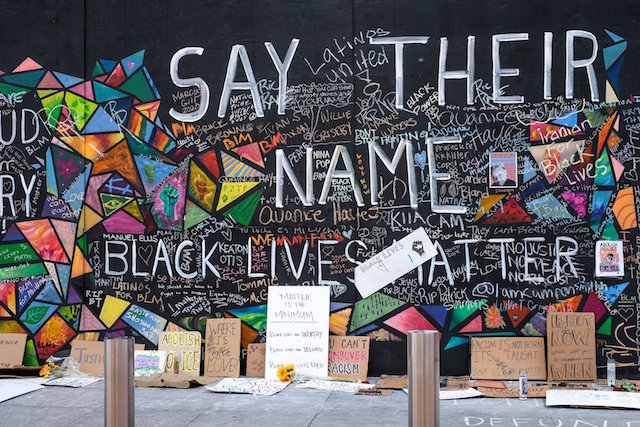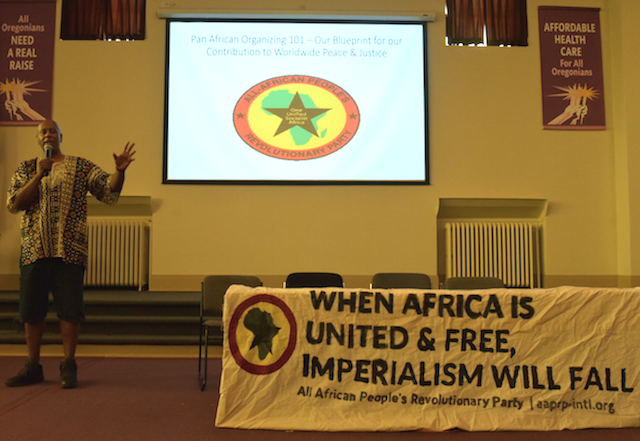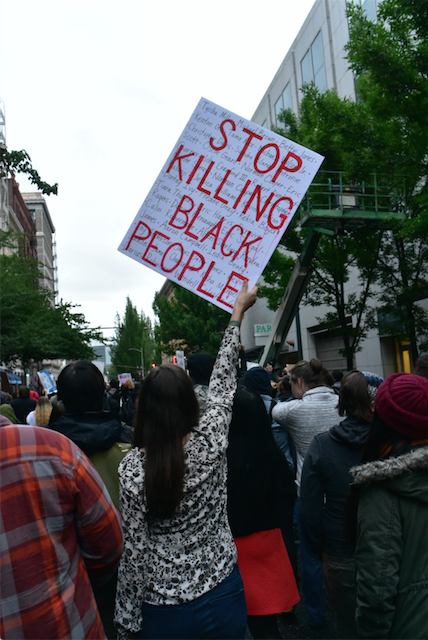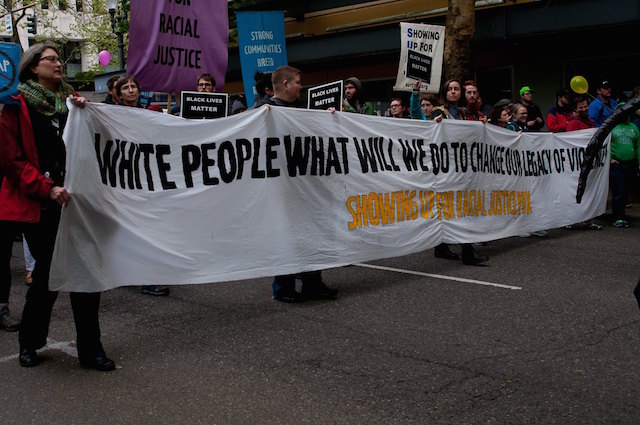
Story by Pete Shaw
What material changes will result from the protests, rallies, and other actions demanding transformation to the way policing is conducted in the United States? Calls range from fairly tepid reform to outright abolition of policing. These protests are connected with larger movements seeking to dismantle white supremacy and policing, which is designed to promote and expand white supremacy, protecting the property of the wealthy at the expense of those from whom that wealth is gained. It is inspiring to see so many, particularly white people, who–prior to the horrific police lynching of George Floyd–had not yet understood police as a threat, mobilizing in the streets and demanding change, even using the term “systemic change.”
Yet two Mondays ago on KBOO 90.7 FM’s More Talk Radio, host Celeste Carey commented that she was not yet ready for optimism because she has seen this before. White people come out for a spell, full of piss and vinegar, ready to take on The Man, and then for one reason or another, but always because they can afford to, go back home, leaving Black people and people of color to continue doing the hard work of organizing for greater justice. It is a soft-pedal form of white supremacy that sometimes has devastating consequences for non-white people and their communities.
While many of the changes that are happening now are meaningful–police officers being held accountable and police being kicked out of schools to name a couple–how long the changes will last, and how much further they will go, remains to be seen. For all these changes, in the 20 days since George Floyd was lynched, police in the US murdered another 120 people.
According to the Washington Post, which has been logging “every fatal shooting by an on-duty police officer in the United States” since 2015, there have been more than 5,000 murders by police, with the rate of Black people murdered by police more than twice that of white people. The tally does not include murders of Black people by vigilantes, the combination of which results in a Black person being murdered every 28 hours.
The problem is systemic, and it will require systemic change, which is something very different from marching in the streets. And if white people truly want to see that change, then they need to involve themselves more deeply than just attending rallies.
For years, Ahjamu Umi of the All-African People’s Revolutionary Party (A-APRP) has been organizing for African liberation. He seems tireless in his pursuit of greater justice, a chase he gives with zeal. During this time of coronavirus and COVID-19, Umi has been hosting weekly online seminars on various issues. His most recent one which aired June 14, “White Accomplices–Truths and Myths,” could not come at a more timely moment. It was a kind of infomercial teaching white people, or Europeans, as Umi often refers to them, how to fight for greater justice alongside Black people–or as Umi says, and this piece will use, Africans–in their struggle for liberation.

One of the primary problems white people carry is a tendency to center themselves and their institutions in nearly all situations. This is a pillar of white supremacy, something white people engage in almost instinctively. It is something we–I am a European of Irish descent–are taught, that our culture and our ways are the ones around which all others should revolve. Popular culture oozes with it. K-12 US History textbooks explicitly center white people, and in the rare case where some form of restitution is done, it too often comes from a white-centric perspective. Thus we can admit that slavery, Jim Crow, the Bracero Program, and even the recognition of the European attempted genocide of the indigenous population of this land they sometimes called Turtle Island, were wrong. But as with so many crimes committed by those with the privilege to write dominant historical narratives, white people also reserve the right to determine what is proper recompense, and what is out of bounds. So though it is fine to admit that what European settlers and colonists did to the indigenous population of what is now the US was wrong, the idea of returning at least some of their land, or making reparations for the wealth they lost due to the theft of their land, remains largely beyond consideration. And when indigenous groups such as the Water Defenders opposing the Dakota Access Pipeline rise up, the full might of the police and military are brought to bear upon them. Again.
So what can white people do to truly support liberation struggles?
Umi, or as it was on Sunday, the Umis, as Ahjamu’s daughter Shukura, who too is a member of the A-APRP, also spoke, pulled no punches as to what white people need to do if they truly want to be accomplices toward greater justice. “All people have the right to determine their own destiny,” said Shukura Umi, “and no true accomplice or partner in combating oppression would seek to define the struggle of people they are supposedly supporting. The basic problem with white accomplices is white supremacy. These people believe naively they are beyond white supremacy, when they actually are it.”
White supremacy takes many forms, but according to Shukura Umi, for the A-APRP it is “the system used to justify colonization and the exploitation of African natural resources,” including the kidnapping and enslavement of Africans, and expands to other areas including the “theft and murder of indigenous land and people, justification for Korean and Vietnamese wars and continued demonization of China.”
Shukura Umi noted that in her experiences most of these self-proclaimed accomplices “can tell you little to nothing” about African liberation struggles and movements and their leaders. But, she added, “white left socialist organizations impose white ideologies onto African struggles,” while “white anarchists consistently demonstrate no respect for African leadership of demonstrations.” As well, Shukura Umi said, there is a fundamental problem with white people “refusing to listen to African analysis of our conditions if our analysis doesn’t center their existence.”
These would-be accomplices, she continued, often “end up creating more traumatic work for colonized people in our movements because we are forced to spend so much energy addressing and correcting white involvement and influences.”
As an example, Shukura talked about how she and her father recently attended the annual the Indigenous People’s Sunrise Ceremony at Alcatraz Island in Ohlone Territory (San Francisco) on “Un-Thanksgiving.” Afterward, they went to Fruitvale Station to take part in a ceremony for Oscar Grant, the 22 year old African man murdered there on January 1, 2009 by a Bay Area Rapid Transit police officer. She described how during the ceremony Europeans kept trying to get into the space, saying that while she was sure they meant well, they were imposing.
Shukura Umi said she and the other non-Europeans told them, “We appreciate you being here, we thank you for being on our side as we fight, but this is a sacred space and you do not have permission to be here.”

“And I don’t think they had ever heard that.”
Forgive me for centering myself, but I am guilty of this. A few years ago, I was at the A-APRP’s Free Breakfast and Education program that was held at New Columbia in North Portland. As a group of young Africans sat at the counter of Columbia International Cup, I went behind it to serve them food. Almost immediately jamelah bourdon of the A-APRP told me it was not necessary for me to do that. She was, as always, busy, and so I felt it was proper of me to ease some of her burden. It was a nice but misplaced thought. So then, with more precise language, she told me she would take care of serving the food because it was important for these young Africans to see Africans doing the work of this program. jamelah shined a graceful light on me, and at least at that moment, I understood.
This by no means made me an accomplice, much less a good one. And I do not consider myself an accomplice, much less a good one. That determination is not mine to make.
So what makes a good accomplice? Ahjamu Umi, who spoke after his daughter had finished her portion of the presentation, laid out four essential qualities.
“The most important ingredient,” he said, “is that a real white accomplice to our struggle has to have a clear analysis about capitalism and imperialism.” It is a step that requires, for many white people in the US, a radical reconsideration of all they have been taught, as well as filling in the gaps of what they have not been taught. For example, when I was in school, we learned about the Age of Imperialism. This lasted from about 1880-1920, when European countries ran roughshod over Africa, looting its resources, although the primary focus of the history books seemed to be on how the competition between those European countries led to World War I. The big villain of the era was King Leopold II of Belgium whose savage ruthlessness in the Congo led to the death of an estimated 10 to 15 million African people. The horror, the horror, indeed.
But in fact, European imperialism and European theft of African wealth goes back much further. First, when Columbus sailed the ocean blue, he kicked off a now 500+ year European project of exploiting the indigenous people of the Americas and the stealing of their land and resources. As Europeans continued their savagery, they turned to Africa for people whom they would enslave to work that stolen land. By the time 1880 rolled around, imperialism in the service of capitalism was just run of the mill, its crimes ignored by various self-serving rationales that later would be summed up by Rudyard Kipling’s exhortation of the US to colonize the Philippines as The White Man’s Burden.
And it has never ended. As Umi often points out, capitalism was built and maintained by the exploitation of Africa and its resources, a fact that remains hidden to many people in the US. Smart phones, for example, rely on cobalt for their lithium ion batteries. 50% of the world’s cobalt reserves are found in the Democratic Republic of Congo (DRC), which accounts for at least 60% of worldwide cobalt production. Along with its substantial supply of coltan, copper, diamonds, and other valuable minerals, the DRC should rank among the world’s richest countries. Yet according to the International Monetary Fund, in 2019, it ranked as the third poorest country in the world, a list whose top ten poorest countries are in Africa. The rewards of mining cobalt are reaped not by the people of the DRC or Africa, but by international corporations like Apple, Samsung, and Motorola, while according to Umi, the life expectancy for miners in the DRC is 35 years.
“Capitalism is the enemy of African people,” said Umi. “It is the enemy of all of humanity. And anybody who is claiming to be a friend of us but is trying to rectify how to coexist with capitalism is no friend of ours.”
Umi believes that same anti-capitalist analysis essential to being a white accomplice literally requires the examination of one’s own back yard. “It’s not possible for you to be an ally against white supremacy and call yourself an American because the concept of America is a settler-colonialist concept which is based on theft of indigenous lands, and the theft and kidnapping of our ancestors to build up this empire.”
Umi maintains that an accomplice needs to be part of an organization that will put analysis into action. “Going to protests is great,” he noted, “but if you leave the protests and you don’t have any assignments, commitments, or anything, we’re not really accomplishing anything except for you to be an audience member at the next protest. And that’s a wonderful thing, but that is not going to get us where we need to get to in order to alleviate the suffering. So that means you have to make a commitment to be engaged in some work on a consistent basis. That means organizational work. You can’t solve the problem by yourself. If you could, you would have done it already.”

Third, Umi underscores the importance of your organization having a “strong political education focus that is anti-colonial, anti-capitalist, anti-white supremacy, anti-patriarchal, anti-homophobic–all those things have to be in place. That’s an absolute necessity.”
Finally, those three elements need a strong working group for them to come together to benefit the organization as a whole. As an example, Umi talked about how the A-APRP has an anti-patriarchy working group that attempts to educate its members about patriarchy. That education is ongoing, and even within your organization it can be a struggle to get members to accept new ideas. “Anybody who seriously engages this work is going to be uncomfortable. You have to be willing to grow beyond what you already know.”
When these four things come together, it is then you have people reaching the level of consciousness necessary to be a true accomplice to the African liberation struggle. “If you’re not part of an organization that has a strong anti-capitalist focus,” said Umi, “and has a primary focus on anti-colonialism, anti-capitalism, objectively you’re part of the problem that we’re facing.”
While there are no easy answers, and no short cuts, the path is clear. “Any real accomplice work has to be engaged in the principle that you are engaging in that work because you have an instinctive love of justice,” Umi said. “It has absolutely nothing to do with anything else. Nothing to do with you doing it because you want to feel good about yourself, or you doing it because you want credit, or you doing it because you just want to figure out a way to be able to say you did something. It’s about making sure that you are doing work with no objective other than achieving justice.”
To see Ahjamu Umi’s presentation, “White Accomplices–Truths and Myths,” go to: https://www.youtube.com/watch?v=9YDQIHpIA78






